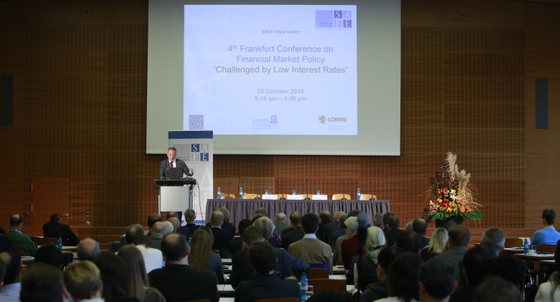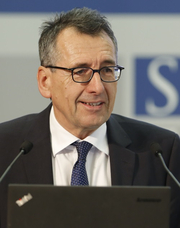
Low interest rates and asset returns have been an enduring legacy of the recent financial crisis. Against this background, the SAFE Policy Center dedicated the 4th Frankfurt Conference on Financial Market Policy, which took place at Goethe University Frankfurt on 28 October 2016, to the topic “Challenged by Low Interest Rates”. After a welcome by Raimond Maurer, Dean of Goethe University’s Faculty of Economics and Business Administration, and introductory remarks by Jan Pieter Krahnen, Program Director of the SAFE Policy Center, Benoît Cœuré, Member of the Executive Board of the European Central Bank (ECB), gave a keynote address on the topic of monetary policy in a low-growth environment.
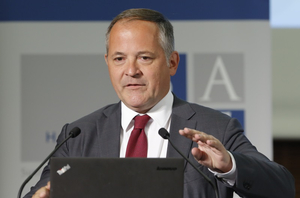
According to Cœuré, the below-potential economic activity in the euro area puts a downward pressure on inflation. Also, lower consumption and investment due to pessimistic estimations about future growth and income prospects worsen the negative output gap. As a consequence, the ECB has to continue unconventional measures to meet its inflation objective. In his view, it is the role of central banks to set interest rates below equilibrium to generate inflationary pressure in the economy and that low and negative interest rates are a direct consequence of the decline in the equilibrium rate. Cœuré pointed out that the monetary policy stance of the ECB has had the desired effect in the euro area and that there is little evidence yet of negative side effects from the ECB’s unconventional measures. At the same time, he also admitted that, if interest rates will be low for too long, negative side effects may come up and impair the effectiveness of the ECB’s measures. He stressed that structural problems need structural solutions and, thus, other actors need to shoulder some of the burden in order to ensure euro area resilience over the medium term. He also called for the completion of the banking union and the capital markets union as well as a solution to the bank-sovereign nexus.
Managing private portfolios in a low return environment
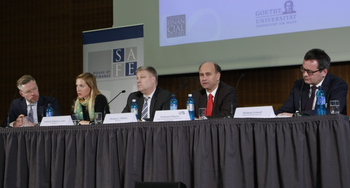
The first of three ensuing panel sessions dealt with “Managing private portfolios in a low return environment” and was chaired by Andreas Hackethal (SAFE & Goethe University). Isabelle Mateos y Lago (BlackRock) stated that low interest rates are not necessarily connected with low returns. Taking risk is still rewarded, she said, an adaption to the new economic environment is however necessary. According to Thomas C. Wilson (Allianz SE) a potential approach could be to shift some risk to the consumer. A focus should be set on transparent products which can be managed at reasonable costs. Raimond Maurer and Helmut Gründl (both SAFE & Goethe University) took the perspective of private households. With respect to retirement saving plans, Maurer called for a change of the investment culture away from products with guarantees which would certainly meet considerable demand, he was sure. Gründl pointed to the importance of improving financial education.
Public Debt Management and Low Rates
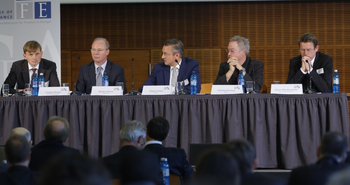
The second panel, on “Public Debt Management and Low Rates”, was moderated by Jürgen Schaaf (ECB). Alfons Weichenrieder (SAFE & Goethe University) pointed to the fact that interest rates have been falling for quite some time – not only since the financial crisis. In order to assess the financial options of states, however, not the interest rates but the difference between growth rate and interest rate was decisive, he said. According to Tammo Diemer (Deutsche Finanzagentur) the low interest rate environment has changed the investment structure of German government debt from mainly private bondholders to central banks. With respect to the maturity of government debt, public debt managers face a tradeoff between planning security (long maturities) and rollover costs (short maturities). Christian Kastrop (OECD) raised doubt about whether the ECB can fulfill the role of a “first ring of defense” against financial crises in the future if the period of low interest rate and quantitative easing persists. He called for a more expansionary fiscal policy to mitigate the negative effects of the crisis as long as there is fiscal space for it. Michael Heise (Allianz SE) underlined the need for a slow but persistent recovery of interest rates by pointing to the danger of a sudden rise for governments, financial markets as well as insurance companies.
Banking – Challenged by Low Interest Rates and High Costs of Equity
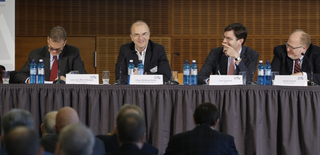
The third panel, hosted by Hans-Helmut Kotz (SAFE and Harvard University), discussed the topic “Banking – Challenged by Low Interest Rates and High Costs of Equity”. According to Adam Posen (Peterson Institute) the structural problems in the European banking sector were already prevalent prior to the financial crisis. The low interest rates were not caused by central banks but by the real business cycle process, he said. Due to low productivity growth and low demographic growth there are no high yield investments at the moment. Economists should no longer deny the existence of “secular stagnation”. Luc Laeven (ECB) emphasized that monetary policy should not be judged based on its effect on individual banks or the banking sector but by its effect on the economy as a whole. Monetary policy does not only affect the quantity but also the quality of bank credits, he said. Banks have, among other thins, benefitted from re-evaluation gains on interest-bearing assets due to lower interest rates. Lorenzo Bini Smaghi (Société Générale) named a number of current challenges for banks: a large amount of savings but very little investment opportunities; an unfinished regulatory framework and, thus, planning uncertainty; competition from fintechs; bad loans on the balance sheets. He stressed that all these challenges have nothing to do with monetary policy. Also, he pointed out that banks in countries with high banking system concentration, such as the Netherlands and Sweden, are more profitable than banks in countries with a fragmented banking system.
